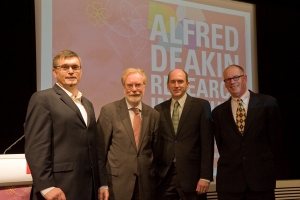Resource riches need not be a curse for PNG
Research news
A vast influx of capital as a result of a natural resources boom can be a blessing for developing countries like Papua New Guinea not a curse, Deakin University’s Chair of International Development Professor Mark McGillivray will argue at Deakin University’s Alfred Deakin Research Institute’s symposium on Papua New Guinea this Friday. (May 27th)
Professor McGillivray will look at development challenges relating to the PNG Liquefied Natural Gas (LNG) project and the country’s journey as it implements plans to set up Sovereign Wealth Funds to manage the government revenue from the project.
“This is a once in a generation opportunity for PNG as the income from the project has been predicted to double the size of the PNG economy,” Professor McGillivray explained.
“However the country is keen to avoid the so-called “Dutch Disease” or ‘Resource Curse” issues such as currency appreciation, inflation and rent seeking, that have been so problematic in other resource rich developing countries.
“A Sovereign Wealth Fund or in the case of PNG – three Sovereign Wealth Funds – allows the country to draw-down the government taxation and dividend revenues from the project as they required to support broad-based development, but in such a way as the economy can efficiently absorb them.”
Professor McGillivray has been working closely with Minister for Public Enterprises Arthur Somare various and the PNG and Australian Government and agencies to establish governance arrangements for the funds.
“In a developing country there are a range of issues to be addressed, in particular what legislative guidelines should there be for the level and use of draw-downs from the funds, ”
“Ventures like the LNG project need not be dominated by resource curse problems and can instead bring very substantial development dividends to developing countries,” he said.
“It is a both challenging and professionally rewarding to be involved in such a process.”
Share this story
 Professor Mark McGillivray (left)
Professor Mark McGillivray (left)
